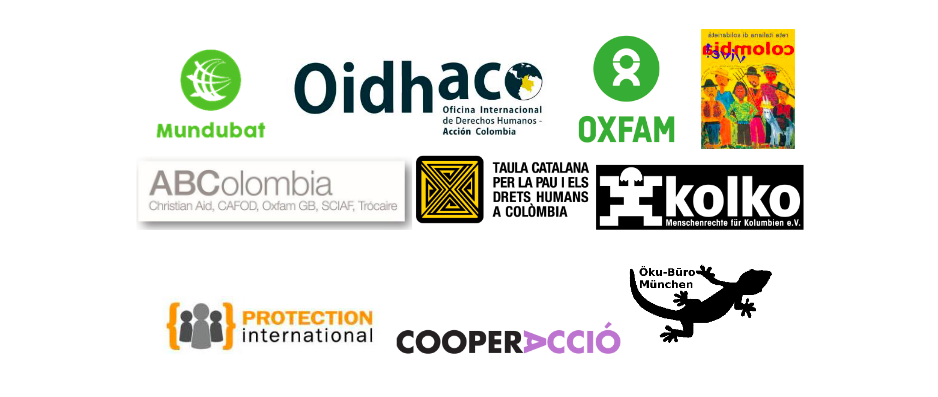Oidhaco and the Undersigned Organisations Express Concern about the Increased Risk to Human Rights Defenders and the Humanitarian Crisis in Chocó
Brussels, 25 October 2021. The undersigned organisations alert the international community to the escalating armed conflict, killings and mass displacements currently taking place in the region of Chocó, Colombia: a geo-strategic region bordering Panama and close to Buenaventura, Colombia’s largest port through which the majority of imports and exports to Europe pass. Oidhaco monitors the Pacific region through its emblematic cases of Bajo Atrato and Buenaventura.
It is with great concern that Oidhaco and the other signatory organisations have received the news of the murders of Dilio Bailarín, indigenous leader of the Embera Uradá-Jiguamiandó reservation, and of Efrén Antonio Bailarin Carupia, former governor of the Chidina Tolo reservation, in Bajo Atrato, in the north of the department of Chocó. Furthermore, in the south of the department of Chocó, in the municipality of Litoral San Juan, there have been mass forced displacements that have affected more than 1,000 Wounaan indigenous people since August 2021; this includes confinement of these communities. In this respect, we join the call made by the mechanisms of the Comprehensive System of Truth, Justice, Reparation, and Non-Repetition (SIVJRNR) for the State to take immediate measures to address the serious humanitarian and human rights crisis that they observed during their visit to the region, where they were accompanied by several embassies.
Organisations including the Justice and Peace Commission (Comisión Justicia y Paz – J&P) and the Centre for Research and Popular Education – Programme for Peace (Centro de Investigación y Educación Popular/Programa Por la Paz – CINEP) and the dioceses of Istmina, Quibdó and Apartadó, among others, have accompanied several of the indigenous and Afro-descendant communities in the region, given that the state has not provided adequate assistance, nor taken urgent measures for immediate attention and protection. The recent murders and harassment of the civilian population occur while the transnational company, Muriel Mining Corporation, through Minera Cobre SAS, is advancing projects in Jiguamiandó and Murindó, to exploit the mining concessions of the sacred hill Jaikatuma and other bordering territories. It is of great concern that the standards of free, prior and informed consultation established by ILO Convention 169 on this matter are not being respected, nor are the orders issued by the Colombian Constitutional Court.
The communities denounce constant incursions by the Gaitanista Self-defense Forces of Colombia (AGC) – a paramilitary successor group – who conflict with the National Liberation Army (ELN). In the midst of and despite a high level of militarisation by the XV Brigade of the Colombian National Army, this dispute for territorial control has led to repeated human rights violations and breaches of international humanitarian law. Threats, torture, kidnappings, bomb attacks, the planting of anti-personnel mines, forced displacement, recruitment of minors and sexual violence have all been reported. On 16 September, in military operations against the ELN, a bombing in Litoral San Juan left 8 dead, 4 of whom were minors, presumably victims of forced recruitment. This information was concealed by the Ministry of Defence.
The indigenous communities, victims of confinement, have repeatedly called for an immediate ceasefire and a Humanitarian Agreement to guarantee their survival and their right to remain in their territories. This request has not been answered by the Colombian government, even though several of the ethnic and peasant communities in the region are beneficiaries of protection measures from the Special Jurisdiction for Peace (JEP) and the Inter-American Commission on Human Rights (IACHR), and of physical protection measures from the Colombian National Protection Unit (Unidad Nacional de Protección – UNP). The effective implementation of these measures and the full implementation of the Peace Agreement between the Colombian government and the FARC-EP could have prevented the escalation of risk to ethnic communities in the region.
We call on the European Union, its Member States, Switzerland, the United Kingdom and Norway to:
- Support the call for a ceasefire and Humanitarian Agreement as soon as possible and for a process of simultaneous territorial dialogues that define political and institutional decisions for real peace, including all actors operating in the regions.
- Through their representations in Colombia, carry out a humanitarian mission to verify the situation of mass displacement and other human rights violations in the municipality of Litoral San Juan.
Also, to urge:
- The National Government: to advance the full implementation of the Peace Agreement and, in particular, the provisions included in the “ethnic chapter” of the Agreement; to implement the programme of collective prevention and protection measures regulated in decree 660/2018; to advance in the design and implementation of a public policy to dismantle the successor structures of paramilitarism in conjunction with representatives of civil society, fulfilling the mandate given to the National Commission for Security Guarantees (Comisión Nacional de Garantías de Seguridad).
- The Ministry of Interior and the National Protection Unit (UNP): to implement the Prevention and Protection Plan urgently and effectively for the communities of the Bajo Atrato as has been ordered by the Constitutional Court in various rulings.
- The National Prosecutor General’s Office: to investigate, identify, and sanction the material and, above all, intellectual authors of the murders, threats, harassment, and human rights violations of which it is aware and on which no progress has been made. Particularly, the Prosecutor General’s Office’s Investigation Unit advances and presents results, by its mandate, regarding the investigation of the successor structures of paramilitarism that continue to operate in the region, without limiting itself only to identifying the material perpetrators.


